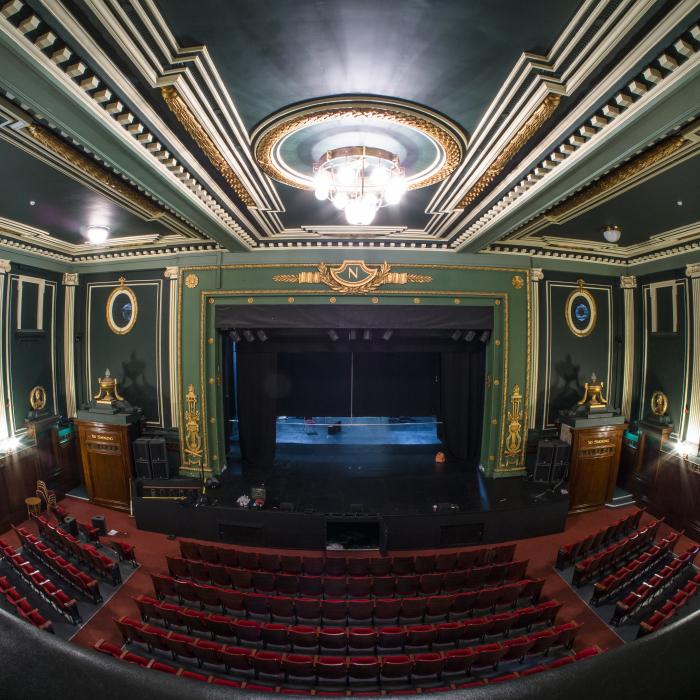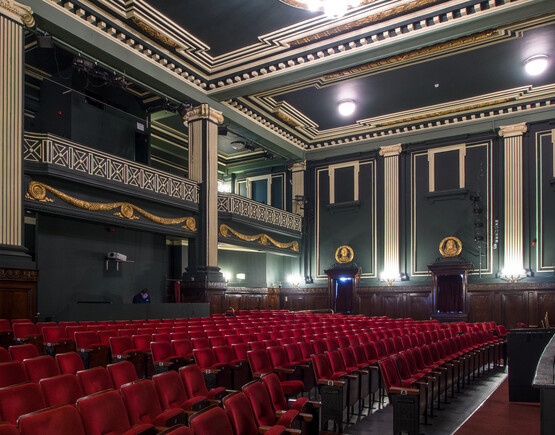Epstein Theatre
Built above a music shop this is an unusual and intimate theatre that has long-served the people of Liverpool.

- Address
- 85 Hanover Street, Liverpool, Merseyside, L1 3DY
- Risk Rating
- 6 (Community Rating: 3, Star Value: 1, Risk Factor: 2)
- Local Authority
- Liverpool City Council
- Owner
- JSM (long term lease from council)
- Architect
- Unknown
- Date of Construction
- 1913
- Listing
- II
- Capacity
- 445
- Database Link
- View in Theatres Database
Significance
Constructed in 1913, the Epstein Theatre was originally conceived as a concert hall (the Crane Hall) for instrumental recitals for the music shop it was built above. The upper levels of the five-storey Crane Building contained associated offices. The hall was soon converted into a theatre through expansion and construction of a flytower and stage within a neighbouring building.
It is a handsome stone and brick building with a canted corner bay announcing the theatre entrance. Internally, the theatre is decorated with mahogany panels and plaster detail. The intimate auditorium is almost square, with a flat panelled ceiling with centre cluster of lights. The upper parts of the wall are decorated with fluted Ionic pilasters, modillioned cornices and busts of famous composers in wreaths. Lower parts are panelled in mahogany with a Greek key frieze. There is a small balcony with panelled front. Urn decorations above the doors are echoed in the square proscenium decoration at the sides.
The building came under threat of closure in the 1960s but was bought by the Liverpool Corporation, who wished to save it for the people of Liverpool.
Following a refurbishment, the venue reopened as the Neptune Theatre and remained operating as such until closure in 2005 for works to address health and safety issues. There followed an extended period of closure, the renamed Epstein Theatre finally reopening in 2011 following a £1m refurbishment.
The entire building (now known as Hanover House) is owned by the council and leased to a commercial property landlord. The council had sub-leased the theatre back from them for a period of 12 years. The theatre has most recently been operated by Epstein Entertainments Ltd who was awarded the operating contract in October 2021 on an 18-month term ending in March 23, corresponding to the end of the theatre lease.

Why is this theatre at risk?
The theatre was added to the Theatres at Risk Register in 2024
Epstein Entertainments Ltd, the last operator, was awarded the contract to operate the theatre in October 2021. The management agreement saw the council covering a proportion of the rent, service charge, utilities and maintenance work for the duration of the 18-month management agreement.
In June 2023, it was announced that Liverpool City Council was unable to renew the lease for the theatre and subsequently the associated management agreement with the incumbent theatre operator. Direct negotiations by the theatre operator with the building landlord, who required a minimum 5-year lease, failed to reach a workable solution and the theatre closed at the end of the same month.
The offices located on the levels above the theatre are also currently disused, causing further vulnerability for the building. Dilapidations due from the previous lease of the theatre require action prior to a new lease term for these spaces. Discussions regarding dilapidations are on-going between the council and the landlord.
Theatre potential
The Epstein had been in active operation until June 2023. It provided a theatre of a different scale to most of the other city centre venues and filled the demand for a programme of more populist community/amateur work supplemented by music/comedy.
The announcement of the theatre’s closure saw much community support for the venue.
There is a demand for the reopening of the theatre, although, it is acknowledged that this would require some subsidy either through rent relief and / or revenue funding. We have also received enquiries from organisations interested in reopening the venue for cultural use since its addition to the Theatres at Risk Register, which is a further positive indication of the continued demand for a reopened and flourishing venue.
Current situation
The theatre closed on 30 June 2023. Epstein Entertainment Ltd had hoped that it could find a solution to reopening the theatre and continuing its popular programme, however this has not proven possible to date
The head lease of the building changed ownership in 2024. The new landlord, JSM, has plans to convert the office space above the theatre into apartments. Under the terms of the lease, it is required to formally seek consent for any change of use including the conversion of the premises into residential units. Theatres Trust has asked to meet with JSM and its design team to ensure that the proposals will not jeopardise the future operation of the theatre.
JSM has further confirmed that it has a potential tenant for the theatre. We look forward to meeting with them to understand more about their plans for the theatre and to working with all parties to safeguard the future of of this important historic venue.
Update March 2025
It has been announced that the Epstein Theatre will reopen later this year. We will share more details when we have them. Read our statement.
Update June 2025
We currently object to planning permission for serviced apartments, as there is a lack of information on acoustic impacts and potential for the theatre's emergency egress to become restricted. Read our full response.
Update September 2025
We are delighted that the Epstein has reopened. We will continue to support the current management to ensure the theatre can thrive.
Images credits: Ian Grundy